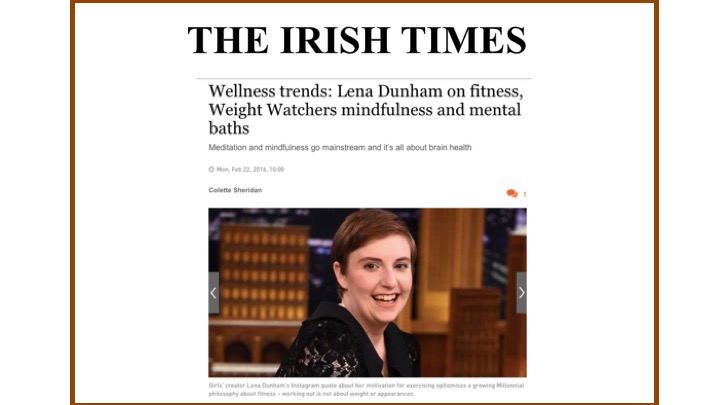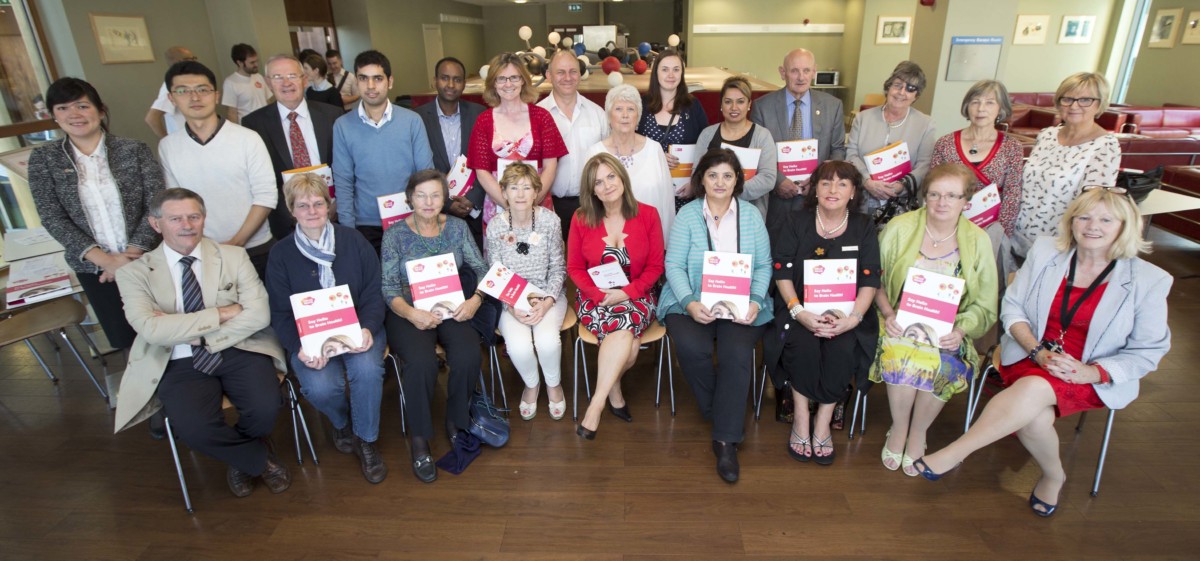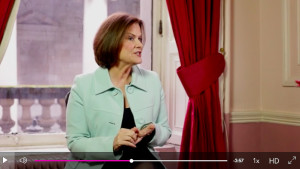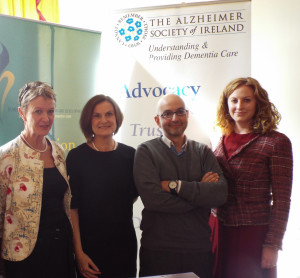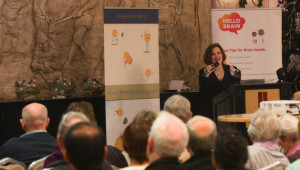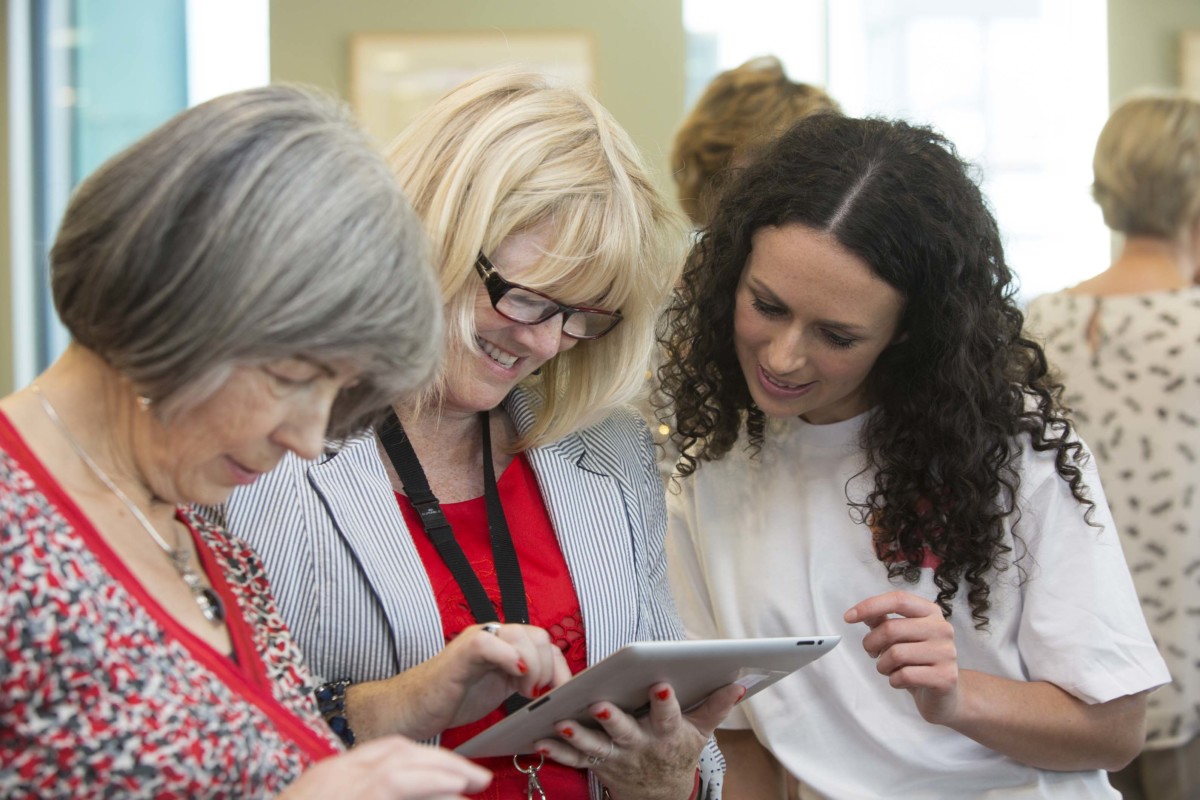 Trinity College Academic Sabina Brennan today, (2nd March 2016), has called on Minister Paschal Donohue TD and his secretariat at Transport, Tourism and Sport to fulfil its duty to ensure the safety of rugby in order to prevent brain injury and concussion in children.
Trinity College Academic Sabina Brennan today, (2nd March 2016), has called on Minister Paschal Donohue TD and his secretariat at Transport, Tourism and Sport to fulfil its duty to ensure the safety of rugby in order to prevent brain injury and concussion in children.
This statement arises from today’s publication of an open letter by 70 doctors and academics calling for the banning on rugby tackling in school games. A link has been found between repeat concussions and cognitive impairment and an association with memory loss, diminished verbal abilities and depression. Sabina calls on the Minister for Transport, Tourism and Sport to show leadership and bring together medical professionals to examine the true impact of these type of brain injuries.
Having already secured millions of euro in funding for brain health awareness, Sabina reacted to the report by saying: “The human brain is constantly changing, your behaviours and experiences can help shape it at any age. Neuroplasticity (or brain adaptability) means that it is not set like concrete but is more like putty and can be reshaped throughout life. Constant collisions in rugby, particularly in the tackle and scrum, can cause injury including head injuries and these can have short-term, life-long and even life-ending consequences for children. It has been shown in studies, that months after concussion symptoms fade, the brain continues to show signs of injury and this can, of course, impair children’s abilities to concentrate and learn in school.”
The open letter also stated that children took longer to recover to normal levels on measures of memory, reaction speed and post-concussive symptoms.
Sabina continued: “ I am calling on our new Government to have this debate. We have no time to lose in acting on this issue, particularly as it concerns the health of our children and young adults. Under the UN Convention on the rights of the child, governments have a duty to protect children from risks of injury and our incoming Government must ensure the safety of rugby.”
 Trinity College Academic, Sabina Brennan today, (1st March 2016), called on the next Government to immediately appoint a senior minister with sole responsibility for the older persons.
Trinity College Academic, Sabina Brennan today, (1st March 2016), called on the next Government to immediately appoint a senior minister with sole responsibility for the older persons.
Sabina believes the appointment of a minister for the older person will protect Ireland’s aging population which is a growing group of citizens. More than half a million people over the age of 65 were eligible to vote in General Election 2016 and their specific concerns are continually being ignored.
Whoever forms the new Government must address the older person’s right to an adequate standard of living as well as their right to the highest attainable standard of healthcare.
At the height of the recession, older people were badly affected by nasty cuts including the removal of the bereavement grant, phone allowance, carer’s allowance, decreased pension allowances and huge increases in prescription charges. Their medical cards were also taken away, in 2008, but 15,000 pensioners turned up to Leinster House to vent their anger and their cards were promptly reinstated.
Sabina stated: “Enda Kenny has said ‘Ireland is a great country in which to grow old’. That may be the case if you are a former Government minister or a politician enjoying the €1m pension, which the average older person certainly does not get. The National Positive Ageing Strategy, which took eight years to draft and has been completely ignored for the past three years, is the definitive blueprint for service delivery across all Government departments. However, a strategy has no value unless it is adopted and implemented.
“It’s time to stop implying that older people are the problem”. Sabina stated “Older people are not ‘bed-blockers’ they are prisoners of a banjaxed health service, kept in acute hospital beds because the HSE supports are not in place.”
The recession caused many important policy decisions to be set aside, including the NPAS. Currently here is no specific person, or department, in charge of issues that relate to the older person and this has to change if the government are serious about planning for population and individual ageing and the time has now come to prioritise older adults
“I will call on the Government to make implementation of The National Positive Ageing Strategy a priority action.”
We are living longer. But do we want those extra years if they are to be spent in poor health? In Ireland the number of years a man can expect to live in poor health rose from 9.5 in 1999 to 14.7 in 2007 for a women (increase is from 11.3 years to 16.8 years).
Globally 1 million people turn 60 every month. The Island of Ireland currently has 1 million people aged over 60. Life expectancy in Ireland for men is 76.8 years and 81.6 years for women. Life expectancy at 65 is rising faster in Ireland than anywhere else in the EU.
While population ageing presents challenges it also presents opportunities. Older adults are an underused and undervalued resource. We can prevent and reduce disability, chronic disease and premature mortality as people age through policies and practices to promote positive ageing and reduce associated lifestyle factors. Ageing is not just about ill-health.
Ageing is not just an older person’s issue. Ageing is not something that suddenly happens at 60 – the ageing process begins the day we are born. Everything that we do across our lifespan influences how healthy our later life will be. Lifestyle choices can offer protection or increase risk of poor health.
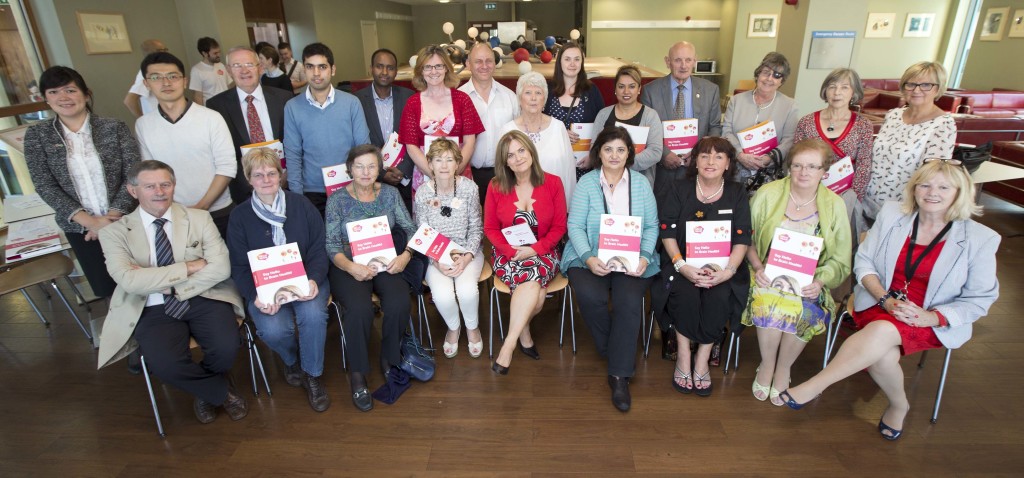
The NPAS Implementation plan should include:
- Appointment of a Cabinet-level Minister for Older Persons with responsibility to implement NPAS
- Translation of the goals and objectives of the strategy into actions on the ground
- The development of key deliverables
- The development of timelines and performance indicators
- The specification of ‘direct responsible individuals’ across Government and wider civil society
The National Positive Ageing Strategy (NPAS) is a commitment in the Programme of Government. The Strategy is a high level document outlining Ireland’s vision for ageing and older people and the national goals and objectives required to promote positive ageing. It is an over-arching cross-departmental policy that will be the blueprint for age related policy and service delivery across Government in the years to come but a strategy has no value unless it is adopted and implemented. When the NPAS strategy was published in April 2013, Government Departments were given lead responsibility for priority actions and an implementation plan was promised (p. 47) but has not yet been delivered. If I am elected to the 25th Seanad I will call on the government to implement and deliver the National Positive Ageing Strategy for all people ageing in Ireland, including people ageing with lifelong disability.
Delivery of the NPAS could genuinely make Ireland the best place to grow old in.
National Positive Ageing Strategy Goals
Goal 1 Remove barriers to participation and provide more opportunities for the continued involvement of people as they age in all aspects of cultural, economic and social life in their communities according to their needs, preferences and capacities
Goal 2 Support people as they age to maintain, improve or manage their physical and mental health and wellbeing.
Goal 3 Enable people to age with confidence, security and dignity in their own homes and communities for as long as possible.
Goal 4 Support and use research about people as they age to better inform policy responses to population ageing in Ireland.
Cross Cutting Actions
- Combat Ageism
- Improve information provision
“I will call on the Government to adopt a Combat Ageism plan to achieve the objectives articulated in the National Positive Ageing Strategy and to appoint a leader with overall responsibility for implementation of the Combat Ageism plan.”
Ageism can affect anyone at anytime in their life, impacting on young people as well as older people. Older adults can and do behave in ageist ways towards younger people. All types of ageism need to be eradicated. However my focus here will be on ageism in relation to older people. Ageism refers to deep-rooted, negative beliefs about older people. Ageism, just like racism and sexism, generates discrimination and inequality, and leads to stereotyping and prejudicial attitudes and practises against older people. Ageism also includes the way older people are represented in the media, which is really important because it can have a wide impact on the public’s attitudes. Generally speaking, older characters are stereotyped as dependent, lonely, disagreeable, and tend to have various physical and mental ailments. Ageism fails to acknowledge diversity..All old people are not the same. In fact, populations of older people are more complex and more varied than populations of younger people. We need to see the person not the age.
View Sabina’s Video: Combat Ageism for Successful Ageing here
The Combat Ageism plan should include:
- Actions to combat age discrimination and to dispel age-related stereotypes
- Awareness campaigns and guidelines for media and other opinion-making actors to give an age-balanced image of society
- Mechanisms to ensure the needs of older people are considered in the development of any policies that might affect them.
- Promotion of intergenerational solidarity and interaction and implementation of mechanisms to ensure that policy developments enhance that solidarity
- Development of intergenerational initiatives at local, regional and national level
Ageism and ageist stereotypes are frequently fuelled by myths and misinformation about older people’s competencies, beliefs and abilities. Education and awareness programmes can be hugely successful in addressing stereotypes and experiences combatting sexism and racism show that attitudes and norms can be changed.
Ageism in Ireland manifests as prejudicial attitudes and practices against older people, if we truly want Ireland to be a Republic of equals then we need to eradicate all forms of ageism. The National Positive Ageing Strategy acknowledges that ageism has a negative impact on the social inclusion and quality of life of older people. The NPAS identifies combatting ageism as a crosscutting objective requiring actions in all policy areas. However given that lead responsibility for combatting ageism in the strategy is assigned to all Government Departments and statutory agencies there is a real risk that this goal could slip through the cracks if no one proactively takes ownership. If elected I will call on the Government to appoint a leader with direct and overall responsibility for the implementation of the combat ageism plan.
Human Rights and Older People in Ireland
Article 1 of the Universal Declaration of Human Rights, 1948 states:
“All human beings are born free and equal in dignity and rights”
Stigma and ageism are major barriers to the realisation of the human rights of older adults. Older people should enjoy the same rights as everyone else.
Older people are often seen, by others and by themselves, as a burden and recipients of care rather than rights holders. Stigma is multiplied in the case of older people with a disability such as dementia. Approximately 36% over 65s have a disability.
International human rights law is the product of a consensus reached by states as to the minimum standards they agree to be bound by, e.g. in the right to education and the right to health. However the right to health and personal social services is not defined in Irish legislation. Enforceable human rights and equality standards need to be embedded into Irish legislation.
Older adults and people with disability are members of the general public and should not be marginalised, excluded or consigned to the appendices of policy documents. Legislation, policy and practices needs to be inclusive and human rights and equality compliant. The rights for older people need to be enshrined in a formal way. It is unlikely that the human rights of older persons will ever be realised without a voice in government.
We need to:
- Appoint a Minister for Older Persons
- (Elect a Senator for Successful Ageing)
In line with United Nations Recommendations we need to:
- Develop and adopt a National Human Rights and Equality Action Plan
“I will campaign for the State to adopt a National Human Rights and Equality Action Plan”
The plan should include:
- Provision for systematic human rights and equality proofing of legislation and policy
- A national programme of human rights and equality education for public and civil servants
- An enforceable requirement for Public Authorities to embed equality and human rights in the carrying out of their functions
- A national curriculum of human rights and equality education for primary and secondary school students
Human Rights Overview
Article 1 of the Universal Declaration of Human Rights, 1948 states:
“All human beings are born free and equal in dignity and rights”
Human rights are based the on principles of equality, dignity and mutual respect and are about being treated fairly and treating others fairly. We are all equally entitled to these rights without discrimination regardless of our age, gender, sexual orientation, disability, religious belief, family status, civil status, membership of traveller community, race, nationality or ethnicity. If elected to the 25th Seanad I will forensically examine any legislation that is sent to the Seanad for revision to ensure that these rights are upheld.
While continuing its commitment to advancing global human rights Ireland must also progress its domestic human rights compliance. If elected I will support recommendations to strengthen, protect and uphold human rights in the state.
Ireland will benefit from an inclusive society based on respect for human rights and equality. I will work to promote understanding and awareness of the importance of human rights in the State and will advocate for investment in related educational and research activities.
The Interdepartmental Committee for Human Rights (IDCHR) was established in 2015 to improve coherence in the signature and ratification of treaties and fulfilment of reporting obligations.
A dualist legal system operates in the State such that ratification of international treaties does not have automatic effect at domestic level. The majority of international human rights treaties that Ireland has ratified have not been incorporated into law. I will call on the Government to improve its track record beginning with ICRPD and OPCAT.
Background
The Irish Human Rights and Equality Commission (IHREC) was established when The Irish Human Rights Commission (HRC) and the Equality Authority (EA) were merged in 2014. The IHREC is Ireland’s National Human Rights institution you can read about its functions here.
The Irish Human Rights and Equality Commission Act 2014 provides for a public sector equality and human rights duty.
Broad Definition of Human Rights in Irish Human Rights and Equality Commission Act 2014
- the rights, liberties or freedoms conferred on, or guaranteed to, persons by the Constitution,
- the rights, liberties or freedoms conferred on, or guaranteed to, persons by any agreement, treaty or convention to which the State is a party, and
- without prejudice to the generality of paragraphs, (a) and (b), the rights, liberties and freedoms that may reasonably be inferred as being
- inherent in persons as human beings, and
- necessary to enable each person to live with dignity and participate in the
economic, social or cultural life in the State;
Links
Equality Act 1998
Equal Status Act 2000
The Human Rights Commission Act 2000
The Human Rights Commission Act 2001
The Assisted Decision-Making Capacity Bill
Irish Human Rights and Equality Commission Act 2014
European Convention on Human Rights Act
The ICCL Project Legacy Statement
The Irish Constitution
United Nations Declaration of Human Rights
United Nations Intersex Fact Sheet
United Nations Paris Principles
Universal Periodic Review
“I will monitor the implementation of the priority actions of The National Dementia Strategy and will call on the Government to take a proactive approach to resourcing additional actions not resourced in the strategy rather than waiting for required resources to ‘become available’.”
Dementia is a global social and economic emergency. There are currently almost 47 million people living with dementia. That figure is predicted to double every 20 years to reach 132 million by 2050. One new case is diagnosed every 4 seconds.
The identification of modifiable risk factors that have the capacity to protect individuals from the onset and progression of dementia represent a wonderful opportunity to develop and implement strategies to raise awareness of the importance of brain health and reduce dementia risk and burden.
The time has come to move from a singular focus on treatment and management to a focus that prioritises prevention and research. A public health approach that addresses vascular risk factors, like high blood pressure and cholesterol, and lifestyle risk factors, like diet, sleep, exercise and social and intellectual engagement, could prevent up to 30 percent of dementia over the next 20 years.
The factors that influence brain health and dementia risk, including low educational attainment, stretch back across the entire lifespan to childhood and even to the womb. So brain health promotion and dementia risk reduction is relevant to everyone who has a brain. (View a copy of my presentation from World Alzheimer’s Day here )
National Dementia Strategy
The Following Priority Actions are to be implemented within existing resources and should be implemented in a timely fashion
- Better Understanding and Awareness
- Timely Diagnosis and Intervention
- Integrated Services, Supports and Care for People with Dementia and their Families (to include people with ID and dementia)
- Training and Education
- Research and Information System
- Leadership
Ongoing work in relation to monitoring the implementation of the National Dementia Strategy is being undertaken by the Alzheimer Society and this work will be key in informing my understanding of the NDS implementation.
A number of additional actions were identified that may require additional resources which according to the strategy will only be considered as the required resources ‘become available’. The Government must take a more proactive approach to resourcing these actions in particular by:
- Promoting awareness of the Assisted Decision-Making (Capacity) Bill to ensure that people with dementia are supported to participate in all decisions that affect them according to their will and preference
- Developing appropriate training courses for family and other informal carers
- Maximising the implementation of the national policy ‘Towards a Restraint Free Environment in Nursing Homes’
- Development and implementation of a dementia and delirium care pathway
Dementia leadership within the Department of Health would be appropriate to advance these actions.
The present structure of the HSE fails people with early onset dementia. Urgent consideration needs to be given by the Health Service Executive to create the necessary structures to overcome the current fragmentation of responsibilities between services for older adults, disability services and mental health services, and facilitate the effective development of dementia care, independent of age.
People in the general population between the ages of 30 and 64 can develop “young” or early-onset Alzheimer’s disease or dementia, but it is increasingly common in the Intellectual Disability population with 15-40% of people with Down syndrome over the age of 40 living with dementia compared with 4-8% of the general population over 65. The average age of onset of dementia for people with Down syndrome is 55 and risk increases significantly with age going from 20% at the age of 50 to 80% at the age of 65.
In December 2014 the Department of Health published Ireland’s first National Dementia Strategy (NDS). The plan was long-awaited and much welcomed by those of us working in the sphere. Given my own research in dementia prevention, my work raising awareness of brain health and dementia risk and my work addressing the stigma I particularly welcome the priority actions around improving understanding and awareness, training and education and research. I commit to monitoring the implementation of these actions, informed by ongoing work being carried out by the Alzheimer’s Society of Ireland of Ireland (ASI)
I advocate for a human rights based approach to dementia policy. People with dementia should have the same human rights as every other citizen. Unfortunately people with dementia often experience discrimination and sadly I have witnessed first hand how people living with dementia are prevented from fulfilling their rights due to cultural, social and economic barriers.
People with dementia have the right to be provided with accessible information and the support they require in order to enable them to exercise their right to participate in decisions and policies which affect them. People with dementia have the right to live as independently as possible, fully included and free from discrimination. Importantly people with dementia should be empowered to access opportunities for education and lifelong learning.
People with dementia have the right to health and social care services provided by professionals and staff who have had appropriate training on dementia and human rights to ensure the highest quality of service.
 Providing support and resources for lifelong learning are essential if the Government are serious about realising the objectives of the National Positive Ageing Strategy. Public policies that support lifelong learning and foster educational attainment have an important role to play in addressing health inequalities and risk of dementia at population level. Sadly the share of adult learners, aged 40 and over, in Ireland is one of the lowest in the EU.
Providing support and resources for lifelong learning are essential if the Government are serious about realising the objectives of the National Positive Ageing Strategy. Public policies that support lifelong learning and foster educational attainment have an important role to play in addressing health inequalities and risk of dementia at population level. Sadly the share of adult learners, aged 40 and over, in Ireland is one of the lowest in the EU.
Education impacts on physical, mental and brain health and education levels of parents influence child and family health. Evidence supports a protective effect of educational attainment on dementia risk in later life. Lifelong learning results in a range of positive outcomes including improvement to our quality of life and well-being, reduced risk of social isolation, and an overall increase in keeping mentally and socially active and in learning new skills as we age. I, myself attended university as a mature student, if elected I will advocate for adequate resources and public policies that support lifelong learning and foster educational attainment across the lifespan.
Letter to Irish Times advocating for investment in life long learning for health
Sir, – I am delighted to see that Age Action has made a recommendation for the 2016 Budget to the Department of Education to increase budgets for lifelong learning (“Age Action highlights ‘huge strain’ of cuts on older people”, September 20th).
Providing additional support and resources for lifelong learning are essential if the Government is serious about realising the objectives of the National Positive Ageing Strategy.
The Age Action submission points out that lifelong learning results in a range of positive outcomes including improvement to our quality of life and wellbeing, reduced risk of social isolation, and an overall increase in keeping mentally and socially active and in learning new skills as we age.
I would like to draw attention to the fact that lifelong learning also benefits our brain health, reduces our risk of developing dementia and increases our changes of living independently in the community in later life. Some of us are able to maintain better brain function as we age, even if we develop the physical damage associated with neurodegenerative disease. 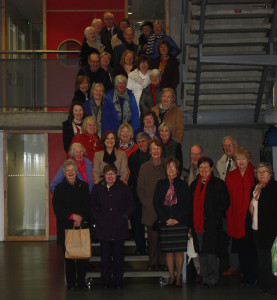
In fact, some people who show the pathological hallmarks of Alzheimer’s disease in their brain do not show any perceptible symptoms of the disease.
This resilience, also known as “cognitive reserve”, appears to be linked to a number of modifiable factors, many of which are also associated with lifelong learning, such as level of education reached, carrying out cognitively demanding tasks and being socially active.
Education is the most broadly and consistently successful cognitive enhancer, better even than drugs or sophisticated technology. Education can build up our cognitive reserve at any point during life.
Public policies that support lifelong learning and foster educational attainment have an important role to play in addressing the risk of dementia at population level. Sadly the share of adult learners, aged 40 and over, in Ireland is one of the lowest in the EU.
With 90,000 of us predicted to be living with dementia in Ireland by 2031, we need to mobilise public health approaches to attempt to reduce the prevalence of dementia through primary prevention.
A whole-of-government approach, as espoused in the Healthy Ireland Framework, that supports meaningful investment in lifelong learning has the capacity to reduce dementia risk and address health inequalities.
I urge both the Minister for Education and the Minister for Health to pay heed to Age Action’s recommendation for increased investment in lifelong learning. – Yours, etc,
SABINA BRENNAN, PhD
Trinity College Dublin,
Dublin 2.





